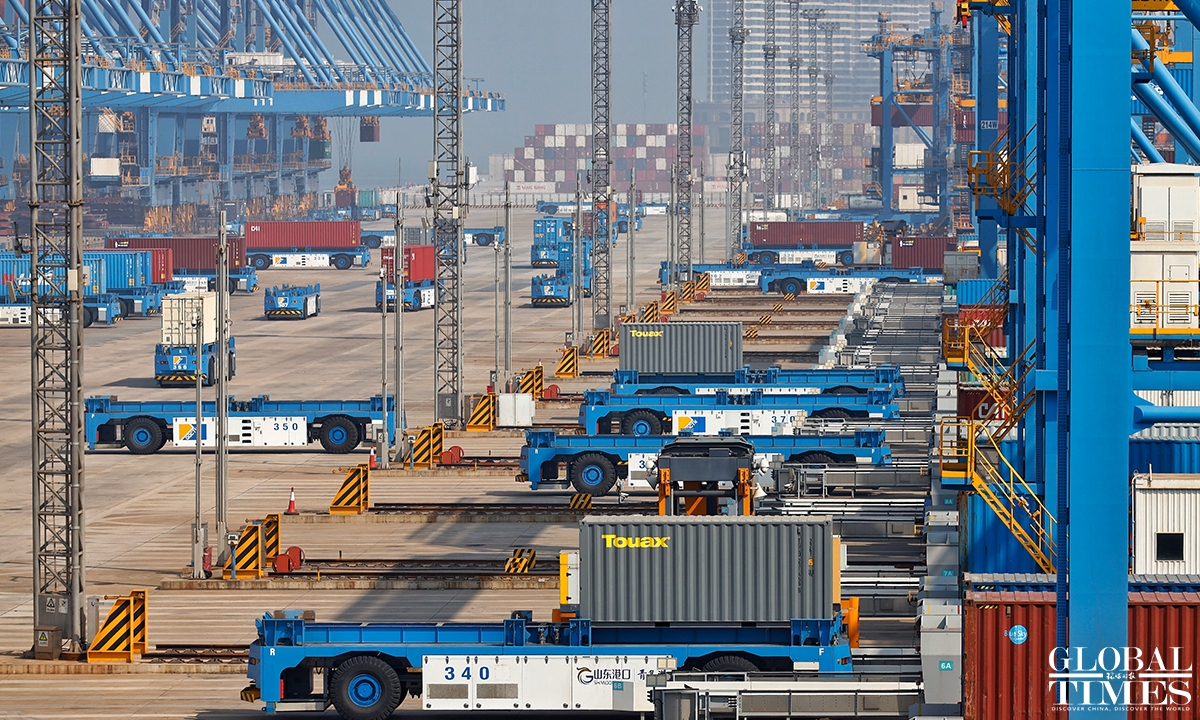

Photo: Li Hao/GT
Trade connectivity between China and Southeast Asian economies has been maintaining steady growth momentum in 2023, about a year after the implementation of the Regional Comprehensive Economic Partnership (RCEP) trade agreement, with fresh port data mirroring a deeply integrated industrial chain among Asian countries and an increasing pivotal role China plays in facilitating an orderly global supply chain.
The robust economic cooperation among Asian economies would inject a much-needed boost to a world economy that has been staggering under multiple pressures, ranging from waning global demand and rising geopolitical tensions to US-led protectionism, analysts said.
Betting on the potential opportunity, shipping and port companies have been mulling over plans to open more customized sea freight routes, and Southeast Asia conspicuously is a focus this year, the Global Times learned.
Qingdao port in East China's Shandong Province, China's fourth-largest port in terms of cargo handling ability, has opened about 100 shipping routes with Southeast Asia to date out of the total 220 routes, Song Guoliang, senior manager of the operation and business department of Qingdao Port International Co, told the Global Times on Tuesday.
"The Southeast Asian bloc is now our biggest trading partner, with 20 percent of the market share," Song said.
The port's trade with Southeast Asia jumped 4 percent year-on-year last year, and has dethroned the US to become the largest trading partner, according to Song.
The rise was in line with a broad expansion in China's trade with other RCEP members. In 2022, the trade value reached 12.95 trillion yuan ($1.88 trillion), up 7.5 percent year-on-year, accounting for 30.8 percent of China's total foreign trade, according to data from the Ministry of Commerce.
The RCEP went into effect on January 1, 2022.
The Philippines officially approved the pact in February, paving the way for all 15 RCEP economies to ratify the world's largest free trade area.
Industry insiders said that the implementation of the RCEP has fostered faster and more economically competitive trade and economic cooperation channels among China, ASEAN, Japan and South Korea as well as other Asian economies.
Song said the port has opened a cold-chain shipping express service for the export of fruits and other agricultural products, such as banana and pitaya, from Southeast Asia to China.
The route only operates periodically, during harvest season when agricultural products mature, and is set to deliver freshly picked fruits from Southeast Asia to Qingdao port within several days.
There's also been a spike in sea transit business in the Qingdao port amid the RCEP's implementation, which now represents 20 percent of its revenue, port officials said, a vivid display of the irreplaceable position China plays in global supply chains - buoyed by its extensive rail and sea network, its manufacturing prowess and a price edge.
"More global shipping companies departing from Japan and South Korea and heading toward Southeast Asia are now transferring their goods via Qingdao port because of the price and service advantage, compared with direct routes," Song explained.
Another hot transit route involves sea-railway combined transportation, which has been gaining steam in recent years as the Asian industrial chain becomes further intertwined, Su Zongyang, vice general manager of the combined transportation center under the Shandong Port Land-Sea International Logistics Group, told the Global Times on Tuesday.
Under this process, goods from ASEAN economies, such as palm oil, are first shipped to Qingdao port and then sent to Central Asia via China-Europe freight trains, and vice versa, according to Su, who said that the popularity of the route "epitomizes the stable multilateral trade order in Asia and the shape of an Asian supply chain in which China is at the core."
The fruitful result of the RCEP has prompted port authorities to further consider potential business opportunities involving ASEAN routes.
"Based on our initial evaluation, one of our container business' focuses will continue pivoting to ASEAN in 2023," Song said, adding that Qingdao port aims to work with global shipping firms to open more routes this year.
In January, the cargo throughput in Shandong port soared 5.3 percent year-on-year to 143 million tons, defying global headwinds, according to data provided by the local port authority.
Industry observers said that the ramifications of the RCEP carry more weight in the midst of a possible global economic recession this year. It would provide a new impetus driving the global economic recovery post-virus, while diluting the fallout of rising protectionism, analysts said.





